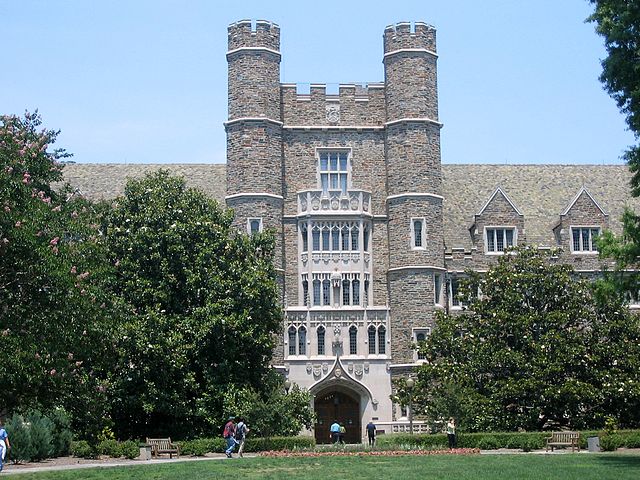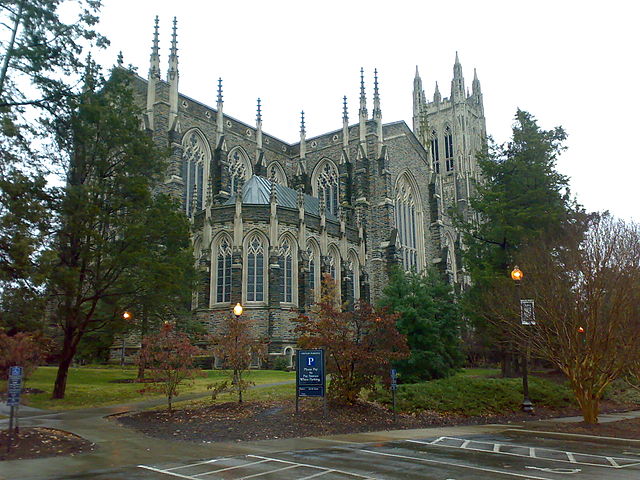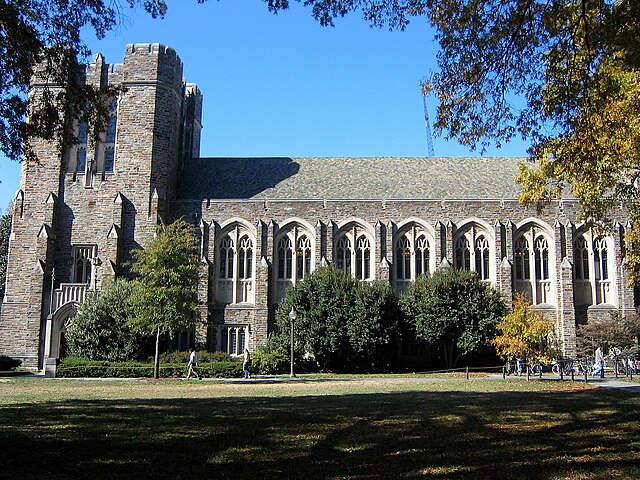
Duke University is a private research university in Durham, North Carolina, the United States of America. As of 2019, 15 Nobel laureates and 3 Turing Award winners have been affiliated with the university. The Thammasat University Library owns a number of books published by the Duke University Press, a distinguished academic publisher.
As TU students grow accustomed to distance education and online learning during the current COVID-19 pandemic, they may look to supplementary sources of information to enrich their educational experience.
By following free massive open online courses (MOOCs) offered by major international universities, they can learn interesting new things while improving their English language skills.
One example is a range of MOOCs offered by Duke University.
Among these, of special interest to TU students in the Thammasat Business School and the Faculty of Economics, is Entrepreneurial Finance: Strategy and Innovation:
Overview
From entrepreneurs to executives, this four-course Coursera Specialization provides an opportunity for you to learn how to advance business innovation in your company and gain insights from leading faculty in the Fuqua School of Business at Duke University.
In the first course, you will learn how to valuate entrepreneurial ventures—including high-growth startups—using Excel spreadsheet models. You will also learn how to discern between the tradeoffs of different financing strategies: loan investments, venture capital, angel investing, and crowdfunding.
The second course will teach you how to manage a startup’s financing strategy, where you will learn how to build capitalization tables (or “cap tables”) in Excel. Cap tables will help you explore different financing strategies for your startup company and determine which financing decisions are best for your entrepreneurial venture.
The third course transitions to an analysis of blockchain technologies, where you will learn how to identify opportunities to disrupt and innovate business models using blockchain as well as avoid poorly executed applications of blockchain to business.
The fourth course will teach you how to use R programming to calculate the return of a stock portfolio as well as quantify the market risk of that portfolio.
This Specialization is also an excellent opportunity for professionals interested in Fuqua’s master’s programs to get an inside look into Fuqua’s faculty expertise and courses.
The class instructors will include Professor Manju Puri of the Fuqua School of Business, Duke University.
As her online biography explains, Professor Puri earned a Ph.D in finance at New York University and MBA from the Indian Institute of Management, Ahmedabad:
Professor Puri is an authority in the field of empirical corporate finance and has particular expertise in financial intermediation. Her published work spans the areas of commercial banks, investment banks, venture capital, entrepreneurship, behavioral finance, and FinTech. Her research has appeared in publications such as American Economic Review, Journal of Finance, Journal of Financial Economics, and Review of Financial Studies. She has been the recipient of the Sloan Research Fellowship as well as multiple awards from the National Science Foundation. Her publication record includes over 30 refereed papers in the top finance and economic journals… Professor Puri serves as Editor of Review of Financial Studies.
The class will be co-taught by, among others, Professor David Hsieh of the Fuqua School of Business, Duke University. As Professor Hsieh’s university webpage states,
he is a member of the finance area. Professor Hsieh received a B.Sc. from Yale University in 1976 for a double major in Economics and Mathematics, and a Ph.D. in Economics from the Massachusetts Institute of Technology in 1981… He holds a secondary appointment in the Duke Economics Department.
Professor Hsieh’s research interest is in financial risk management. His current research focuses on the risk and return of hedge funds, with articles appearing in the Journal of Finance, Review of Financial Studies, Journal of Portfolio Management, Journal of Fixed Income, and Financial Analyst Journal. He has presented his research on hedge funds to the Federal Reserve, the International Monetary Fund, the Bank for International Settlements, the Commodities Futures Trading Commission, in addition to academic audiences at universities and conferences.

Another course of particular interest to TU students who are involved with political science and history is Civic Engagement in American Democracy:
Overview
How does the American political system work? Who are some of the key actors? What are key concepts for a student trying to understand what’s going on? How can I as a citizen influence politics? Civic Engagement in American Democracy takes on these and other key questions. This course will provide you with a strong foundational introduction to U.S, politics.
The class instructors will include the political scientist Professor Bruce Jentleson.
His areas of expertise are international relations, diplomacy, foreign policy–United States, geopolitics–Middle East, global governance, globalization, grand strategy–United States, human rights, humanitarian assistance, international organizations, and international security, politics–United States.
Professor Jentleson earned a Ph.D. degree at Cornell University, following a master of science diploma at the London School of Economics, United Kingdom, and a bachelor of arts degree at Cornell University, New York, USA. The TU Library owns some books written by Professor Jentleson, among them American Foreign Policy: The Dynamics of Choice in the 21st Century, which is shelved in the Pridi Banomyong Library, Tha Prachan campus. The TU Library collection also owns a book coedited by Professor Jentleson, Foreign Military Intervention: The Dynamics of Protracted Conflict, shelved in the Professor Direk Jayanama Library, Tha Prachan campus. TU students may obtain other works written and edited by Professor Jentleson through the TU Library Interlibrary Loan (ILL) Service.
A coinstructor for the course will be Professor Nicholas Carnes, a specialist in public policy and political science at the Sanford School of Public Policy, Duke University.
On his university webpage, Professor Carnes explains,
Most of my research focuses on why so few working-class citizens (people employed in manual labor, service industry, and clerical jobs) go on to become politicians and how their virtual absence from our political institutions affects public policy.
My first book, White-Collar Government: The Hidden Role of Class in Economic Policy Making (University of Chicago Press, 2013), uses data on Congress, state legislatures, and city councils to measure the effects of this phenomenon. It argues that, like ordinary citizens, politicians from different social classes have different views about economic issues, and that leaders from the working class bring a more pro-worker perspective to public office. These differences, coupled with the virtual absence of politicians from the working-class, ultimately skew the policymaking process towards outcomes that are more in line with the upper class’s economic interests. As the old saying goes, if you’re not at the table, you’re on the menu.
Why, then, aren’t working-class Americans at the table? My second book, The Cash Ceiling: Why Only the Rich Run for Office–and What We Can Do About It (Princeton University Press, September 2018), asks about the causes of white-collar government, that is, what exactly prevents qualified working-class Americans from holding elected politcal office. It argues that workers themselves and voters are not to blame–there are lots of qualified workers out there, and when they run they tend to do fine–but rather that workers seldom hold office because the practical burdens associated with running (time, lost income, etc.) make it all but impossible for them to launch campaigns, and the political and civic leaders who could help them usually pass over qualified workers in favor of more familiar white-collar candiates. These obstacles aren’t insurmountable, however, and The Cash Ceiling discusses some of the reforms that might help, like targeted programs that identify recruit, train, and support working-class candidates.
With my co-author Noam Lupu, I’ve also published several cross-national studies on the causes and effects of government by the privileged around the world, and we’re currently working on a book-length project that asks why the rich so consistently govern in virtually every electoral democracy on the planet.
More broadly, I’m also interested in American democracy, political accountability, partisanship, and the rural/urban divide in American politcs. I also co-founded and chair the American Political Science Association Organized Section on Economic and Social Class Inequality.
TU student may read books by Professor Carnes through the TU Library ILL service.
Other MOOCs at Duke University of potential interest for TU students range from Copyright for Multimedia to Chimpanzee Behavior and Conservation and The Works of T.S. Eliot.

(All images courtesy of Wikimedia Commons)
